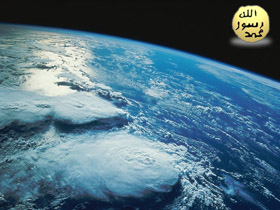One fact about the universe revealed in the verses of the Qur'an is that the sky is made up of seven layers:
It is He Who created everything on the earth for you and then directed His attention up to heaven and arranged it into seven regular heavens. He has knowledge of all things. (Qur'an, 2:29)
Then He turned to heaven when it was smoke. In two days He determined them as seven heavens and revealed, in every heaven, its own mandate. (Qur'an, 41:11-12)
The word "heavens," which appears in many verses in the Qur'an, is used to refer to the sky above the Earth, as well as the entire universe. Given this meaning of the word, it is seen that the Earth's sky, or the atmosphere, is made up of seven layers.

Today, it is known that the world's atmosphere consists of different layers that lie on top of each other.19 Based on the criteria of chemical contents or air temperature, the definitions made have determined the atmosphere of the earth as seven layers.20 According to the "Limited Fine Mesh Model (LFMMII)," a model of atmosphere used to estimate weather conditions for 48 hours, the atmosphere is also 7 layers. According to the modern geological definitions the seven layers of atmosphere are as follows:
1. Troposphere
2. Stratosphere
3. Mesosphere
4. Thermosphere
5. Exosphere
6. Ionosphere
7. Magnetosphere
The Qur'an says, "[He] revealed, in every heaven, its own mandate," in Surah Fussilat 12. In other words, Allah is stating that He assigned each heaven its own duty. Truly, as will be seen in following chapters, each one of these layers has vital duties for the benefit of human kind and all other living things on the Earth. Each layer has a particular function, ranging from forming rain to preventing harmful rays, from reflecting radio waves to averting the harmful effects of meteors.
The verses below inform us about the appearance of the seven layers of the atmosphere:
Do you not see how He created seven heavens in layers? (Qur'an, 71:15)
He Who created the seven heavens in layers… (Qur'an, 67:3)
The atmosphere only lets rays required for life reach the Earth. For example, ultraviolet rays make it to the world only partially. This is the most appropriate range to allow plants to make photosynthesis and eventually for all living things to survive.
The Arabic word "tibaqan" in these verses, translated into English as "layer" means "layer, the appropriate cover or covering for something," and thus stresses how the top layer is well suited to the lower. The word is also used in the plural here: "layers." The sky, described in the verse as being in layers, is without doubt the most perfect expression of the atmosphere. It is a great miracle that these facts, which could not possibly be discovered without the technology of the 20th century, were explicitly stated by the Qur'an 1,400 years ago.
19. Michael Pidwirny, “Atmospheric Layers,” 1996, http://royal.okanagan.bc.ca/mpidwirn/atmosphereandclimate/atmslayers.html.
20. “Numerical Prediction Models used by NWS,” Integrated Publishing, www.tpub.com/weather3/4-27.htm.



